- Home
- E. E. Knight
Dragon Avenger Page 5
Dragon Avenger Read online
Page 5
She felt dirty, and found a rock where she could bend and stretch and extend her scales to the afternoon sun. Sunlight cleaned the crevices around the scale-root almost as well as water but felt a sky’s worth warmer, especially with a snake dinner inside.
A prrum might even have been forming in her throat, until her memories betrayed her: Auron would have been a fine snake-hunter, quick as he was. Why couldn’t he be with her?
Stop it, Tala. Auron is in the past, gone save for a scratch on a rock and your memories.
Except for his head and his claws, perhaps. What sort of wretched hominid ritual are they being incorporated into? Mother said the hominids used dragonkind for medicines and magic, if they were lucky enough to get one down.
“Stupid hearts. Give him up.”
Or did they know something she didn’t?
Wistala looked to the sky, to the late afternoon sun, now disappearing behind a bank of clouds. There’d be a rain tonight, if not a storm. She should nap on the ridge, and then shelter from the storm in one of the caves.
And lose half a day finding Father.
She picked her route down the ridge.
Wistala would have avoided the great claw-shaped cave, for it smelled like bears—but for the sounds wafted up from it. A breeze blew out of the cave. Perhaps it was another chimney from the Lower World, similar to the one she’d climbed with Auron.
As this one didn’t have to travel most of the way up a mountain, the path to the Lower World must be shorter. It conducted sounds, strange rhythms that couldn’t be natural, unless the air was moaning on its way up thousands of individual channels.
She ventured into the cave, found a bone-strewn ingress that had been collecting odds and ends since the forming of the world. But a trio of cracks sent air and sound up from below.
Voices.
She couldn’t pick out individual words, and indeed she could hardly swear that the voices she heard weren’t in her imagination rather than some trick of wind. But the rhythm repeated itself again and again every hundred heartbeats or so.
A song.
No dragon song—that, she’d be able to comprehend. Probably dwarves, singing as they worked or buckled on helm and shield to go kill more hatchlings. This was not a light, glad sound like that of a bird happy to get the morning dew off its feathers; this was a dirge such as a mother dragon might sing over empty, broken eggs. She hoped Father had given the dwarves reason to lament.
Dwarf voices meant dwarf tunnels, chambers, and mines. She must be getting near the tower-girded lake.
And Father.
Sing-song a dragon’s dead!
No more wingwinds, no more dread,
Sing-song, a firestarter’s dead!
The song awoke Wistala from her predawn nap beneath a fallen tree. Some surviving branches still held up part of the bole, and a fresh start emerged from one of the roots—a testament to the resiliency of oaks—and she’d taken shelter beneath it, waking to find fresh spiderwebs all around and the birds cheering.
Wistala’s chest heart shrank to the size of one of the wrapped flies in the web by her nose.
Curse the birds and their tinder-dry nests. “What news?” she called in birdspeech.
“Great news, giant log-turtle,” a grackle chirped. “A dragon’s down by the river-gorge.”
“I don’t believe you.”
“Look under the buzzards, then. Already they gather.”
Wistala came out from under the log, and the birds went silent. She heard some tiny frightened peeps.
A tall pine stood nearby. She ran to it, climbed its regular, neatly spaced rungs as high as she dared. She saw mountains and many treetops and butterflies and an overcast pushed up against the snowcaps but—
No. There they are. Oh for my wings, for just one hour’s use of my wings!
She went down the pine recklessly, headfirst, in a series of controlled falls, letting the springy wood and interlaced branches catch her, not caring how the needles stuck or the sap clung to her.
She landed with a thump.
Wistala hurried through the forest, crashing through bramble and sending dead leaves flying, leaving a trail a blind elf could follow by touch. The first hot rush wore off, and she settled into an agonized dogtrot, her breath now louder than her footfalls.
The ground became treacherous and thin soiled, with pines and beeches clinging to strips of earth between rocks flattened and rounded and moss-bitten. She jumped, reached a prominence where she could see through the scattered trees, and corrected her course across blue-green stone with sharp edges that bit her sii.
Dragons aren’t built like horses or wolves, though their legs can get them over short distances at speeds that surprise—and kill—the unwary. They walk over long distances easily, resting tail and head on the ground frequently with weight otherwise divided between their four powerful limbs. But they are poor runners beyond the limits of a dragon-dash.
Wistala, though thick-bodied and strong, was no exception. After the first burst, all she had to give in her run was determination. She matched it against the fire in her lungs, the pain in her high-joints, the fatigue in her muscles. Her field of vision shrank until she saw the forest as though through a long dark tunnel. Hearing was gone save for the sound of her hearts pounding; all she could smell was blood-tinged saliva flowing from her mouth, thanks to stress-ruptured vessels in her long lungs.
White froth hung from her dry mouth.
She hit the gorge first, crashing through bushes, scattering berries that bruised into sickly scent. Only a quick saa-dig saved her tumble down the hillside.
Steep-sided, fern-covered fells flanked a river of frothing white and mist. Just beyond a rainbow created by the rising water, the river threw a wide loop around a prominence that resembled the upper half of hominid leg bone. A long wall of rock ran out to a knoblike point, surrounded on all sides by water.
The carrion birds circled above the stony bulge. Every now and then one would dip its wings and go lower and the others would follow; then it would rise again, but never quite so high as when she had first marked them.
Just when her body needed to hurry most, it betrayed her. She tripped, she stumbled, lost in a yellow-and-pink fog that played tricks on her vision.
Then she stood on the peninsula, the river rushing in opposite directions a dragon-length to either side, the peninsula riven and notched like vertebrae. Her run became a stagger on stones treacherous with green slimes and gray lichens.
Then to the knob, a scarp like a castle keep with ferns clinging to the side as though they were freshly hatched spiders drying themselves on the egg sac. The birds no longer whirled above.
Wistala smelled dragonblood, and the mists cleared. Ancient irregular steps were cut into the side of the rock prominence, but ferns had taken over. She climbed the stairs on a carpet of green.
The rock was somewhat flatter at the top, stonework like that of the battlements outside the home-cave crowning it. Three mighty toothlike obelisks stood upright, rough hewn, with lichen blurring glyphs carved into the sides facing each other. Had they all been standing, they would have made a roofless cage, but the rest had fallen with broken pieces strewn all about. They lay on their sides, half-covered by jagged pines all leaning upstream.
The ruin of her father lay in a depression in the center, his own blood in a pool all around. Feathered spikes thrust into riven scales covered his back like fur. He had but five horns now, one was broken off at a great notch in his crest, and he couldn’t fold one griff thanks to an ax-head stuck in it. Blood ran from under his sii.
“Father!”
Brown-and-white carrion birds, perched at the tops of the obelisks, took wing at her cry.
She dashed to him, licked at a dimpled wound under one closed eye that hardly even bled. She didn’t begin to know how to manage the rest.
His other side was just as bad. The hilt of some mighty weapon, notched like an arrow but the size of a spear, projected about the
length of her tail from his side. The back was attached to a chain, and the chain to a heavy round ball that had cracked the ancient stone where it landed. Had father flown dragging that?
“Ayangthe, I’ve hurt myself on the slate pile. Jumped too far down. Is Mother asmelled?”
“Father, it’s Wistala. Wistala.”
Father grimaced. “You’re a star, Wistala—I saw you twinkling beneath dear Irelia last night. You, Auron, and Jizara all in a row. I’ll be up there soon. Wait.”
“Do open your eye, Father.”
“Can’t. Light hurts.”
“What do you think you’re doing?” one of the condors croaked. “He’s done for.”
Wistala ignored the judgment, though she admired his birdspeech. It had a loftier tone than the grain-brained bush-hoppers.
“You’re only making it harder for him,” the condor continued from his high obelisk.
What had Mother told her to do with wounds? Oh, it was in one of her Lessons. The hatchling and the wounded tiger, of course! Dwarf’s-beard! It loved rotting old logs, especially damp ones.
“Father, I’ll be right back. I’m going to help you.”
Novosolosk, the little black dragon, had just ventured above ground. . . .
She looked up at the condor: “Fair warning! I see any of you pecking at him, I’ll be venting feathers for a week.”
“Perish the thought.” The condor fluffed up his feathers and settled. “I’m eager to see how you manage this.”
While hunting rock rats, Novosolosk found himself trapped atop a low jungle kopje by a great tiger. The tiger prowled round and round the base of the kopje, growling and panting.
She looked off the east side of the knob at the river-turn. Sure enough, masses of logs had washed up against the rocks at the base of the peninsula, wetted by the constant spray of white water. Along with more mundane lichens, tufts of gray hung from cracks and knotholes in the logs.
Novosolosk tried to bargain with the tiger for safe passage out of his territory, but the tiger just spat abuse in return. He noticed an arrow through the tiger’s neck, broken shafts sticking out either side of his coat, the orange and white gone brown with blood and green with pus.
“Tiger, tiger, I can extract that arrow. . . .”
Hope gave her tired body new life. She eschewed the cut rocks for a quicker climb down the side of the knob. Going down would be easier than coming back up. . . .
Novosolosk went to the swamp, the tiger padding along just behind, its hot breath on his tail and drops of saliva falling like rain. He expected the tiger to jump at any point . . .
Sure enough, a few of the logs had thick growths of dwarf’s-beard. The plant appeared to like broken-off ends, for some reason, or split trunks. It spilled out of the rotting black wood in a thick thatch of gray, interlaced and layered and almost woven in a way that made it difficult to tell where the growth began and where it ended. It reminded Wistala of the hair shirt from the man Father brought back to the cave for Auron to learn hominid-killing. One final test.
As the tiger groaned away, Novosolosk broke a piece of the moss at a thick joint. It was joined by a whitish band. He blew on the band. It stretched and waved in his breath but did not break. . . .
She tore off two hunks of moss, carried it in her mouth back up the stairs, feeling a bit like a bullfrog she’d seen croaking away in a stream with his windbag expanded under his chin. She took the stairs in a series of leaps.
Novosolosk crushed the moss in his sii and pulled out the arrow with one quick motion. The tiger yowled and swatted him across the crest, but he pressed the mass to either side of the hole the arrow left. Dwarf’s-beard both staunched the flow and cleaned the wound, so powerful is its magic, and the tiger’s angry fever came down. . . .
She listened to Father’s heart when she crept under his wounded sii. Father would not move his limb; she had to wedge herself into the gap between body and arm like a river clam and then flex her back so she could get at the wound.
The ugly red gash gave off a pulse of blood from one end, a steady flow from the other. She packed the wound with dwarf’s-beard, crushing its laced branches with her sii until they were sticky with the whitish gunk. It had been a brave dwarf that came so close to his sii to open the bronze dragon’s breast with his ax.
Father looked relieved as soon as she wiggled free of his armpit, although whether this was from instinct at being able to press the wound closed again or comfort brought by the dwarf’s-beard, she couldn’t say.
The stream of blood feeding the pool Father lay in slowed.
Wistala sank to her joints.
“Thank you, Novosolosk.”
Chapter 8
I still say he’s going to die,” the condor insisted.
Most of his cousins had left by the time the sun set, but a few still circled far above. The old yellowbeak chuckled every time Wistala limped up the long, long staircase, bearing another mouthful of dwarf’s-beard.
Wistala worked from nose-tip to tail, crushing the growth and placing it atop Father’s wounds. Sometimes it fell out again right away, and every time Father shifted his position, he exposed new wounds.
“Prophecies and fallacies, I’m starting to enjoy proving you wrong,” Wistala said.
“Ah, but there I’ve got you, if you’ll take the high view. There’s no hole so deep or airs so lofty for any of us that old Father Death doesn’t visit. He’s more reliable than even your fire. We, his humble retinue, clean up after him. How about giving us a taste and letting me warm my chilled grippers?”
“I’ve no fire yet, and even if I did, I wouldn’t waste it on a grouser like you.”
“Grouse! I’m a High Mountain Condor, hatchling. Barring your kind, no one matches my wingspan save the lost Rocs of the east. And once you dragons are gone—”
“What’s that you say?”
“Please, take no offense. We carrion birds value our manners. If I spoke on a delicate subject—”
“I should have asked you to explain yourself. Do you mean once Father and I leave the river, you’ll be the skyking?”
The condor clacked his beak. “I rarely see a dragon anymore. In the time of my father’s father’s father’s egg, I’m told your kind were thick in these mountains, and there was good feasting on the remains of your kills, for kind dragon lords always offered fresh, delectable heads with eyeballs intact to us of lesser wing.”
Wistala wondered how many other caverns hid butchered, moss-covered families. “Who is driving the dragons away?”
“Perhaps you should ask your father that, if he ever speaks again.”
“You must see everything. I’ve seen you soaring as high as a dragon.”
The condor straightened a little; birds were as vain as dragons sometimes.
“So who can master dragons and bid them depart?”
“The hominids, I suppose. They do shape the world to suit themselves, don’t they?”
“The world wins back, in the end,” Wistala said, thinking of the toppled, overgrown battlements around the home cave.
“We condors look to the day of the Last Swancall. Do you know what a swancall is?”
Wistala twitched her nose. “No.”
“It’s a great metal thing shaped like a dragon’s neck, and it makes a call as loud as the white swans you see on the lakes of the north. The hominids blow them before slaughtering each other. We carrion birds wait upon the war of the Last Swancall, when all the hominids kill each other off; then there’ll be the vast battle feast in celebration and the world will be given over to we of talon and feather again.”
She sniffed at the wound around the great shaft. It smelled evil. While waiting and dreaming of the condor’s last swancall might be pleasant, she’d have to venture along the slippery banks of the river in search of more dwarf’s-beard.
A clear morning sky brought rainbows to the waterfall upriver. If Wistala weren’t so weighted down with worry, the bright colors would have made her h
earts glad. But Father still seemed to be worsening.
“Wistala, I’m so thirsty,” Father panted. “I’ll perish of it before I can move again.”
River, river all around, and not a drop within reach. Father chose a good location to collapse, for it would be difficult and dangerous to cross and climb all the slippery rocks for a hominid bearing arms, but he couldn’t reach the river swirling below as it bent back around the knob.
“But you must move!” She didn’t have enough digits to count how many times she urged Father to move. The blood around him had dried into a brown stain, still claw-deep and sticky under his scales.
Father pressed his back against a horizontal slab at the center of the knob, not a fallen obelisk but obviously a cutting of some importance, judging by how it stood on a little platform. His claws slipped against the stone. He rolled a little, got his claws under him.
Wistala had to look away; she couldn’t bear to see Father’s limbs trembling under him again. Father’s mighty head fell.
Gluck-glk-glub . . .
Is Father crying?
“He must have water,” Wistala called.
The watching condor looked at the sky, checking for rain clouds, perhaps. “Were you speaking to me?”
“No . . . yes.”
“Water flows up to down, not down to up. What you need is a train of pack-dwarves carrying waterskins.”
“Waterskins?” Wistala asked, thinking it was some sort of plant.
“Hominids make them. They scoop out the insides of sheep and lambs and fill them with water to drink on journeys.”
Hominids must have stomachs stronger than the condor above to drink water stored inside rotting flesh. Disgusting creatures.
Why did the condor spew such a useless detail? He might as well have said, “You need a good rainstorm,” or “A spring bubbling up through these rocks would help.” She wouldn’t begin to know how to scoop out a dead animal and fill it again with water. They had nostrils, throats, tailvents, never mind the holes one made while killing it. If she could reach up and grab the condor, she’d be tempted to try it with him . . . squeeze it out like mother bringing up a tenderized sheep for hungry hatchlings.

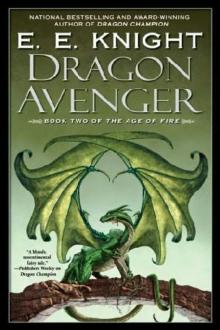 Dragon Avenger
Dragon Avenger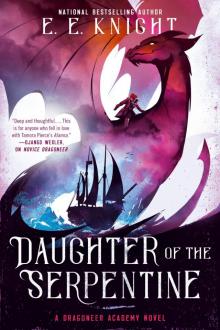 Daughter of the Serpentine
Daughter of the Serpentine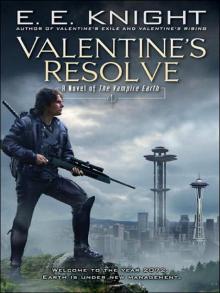 Valentine's Resolve
Valentine's Resolve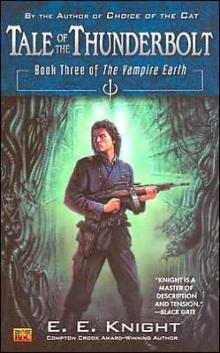 Tale of The Thunderbolt
Tale of The Thunderbolt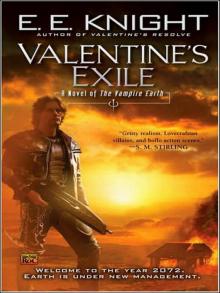 Valentine's Exile
Valentine's Exile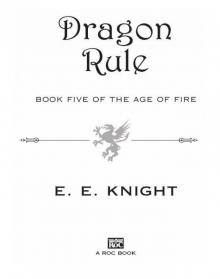 Dragon Rule
Dragon Rule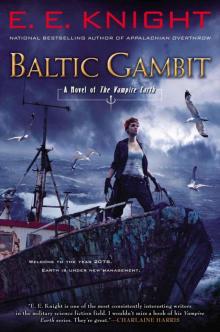 Baltic Gambit: A Novel of the Vampire Earth
Baltic Gambit: A Novel of the Vampire Earth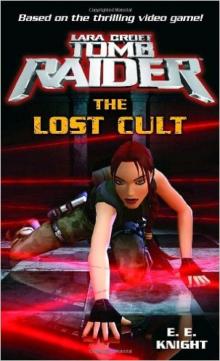 Lara Croft: Tomb Raider: The Lost Cult
Lara Croft: Tomb Raider: The Lost Cult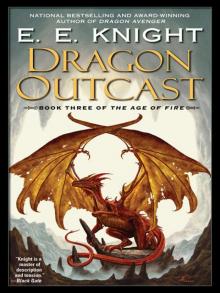 Dragon Outcast
Dragon Outcast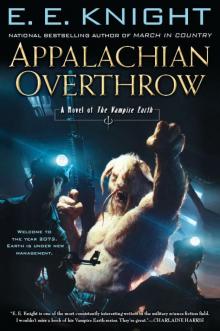 Appalachian Overthrow
Appalachian Overthrow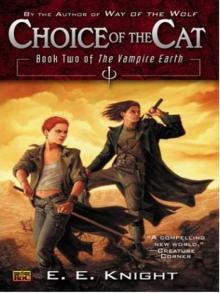 Choice of the Cat
Choice of the Cat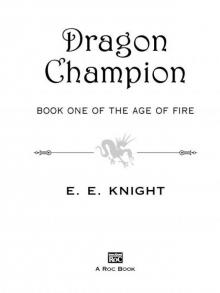 Dragon Champion
Dragon Champion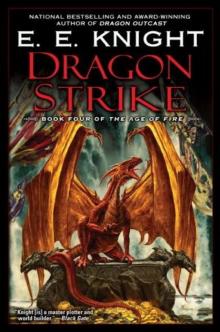 Dragon Strike
Dragon Strike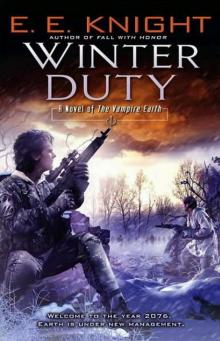 Winter Duty
Winter Duty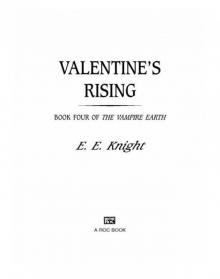 Valentine's Rising
Valentine's Rising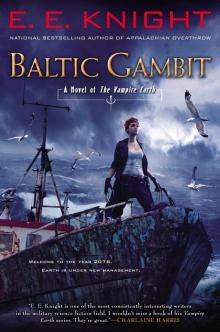 Baltic Gambit
Baltic Gambit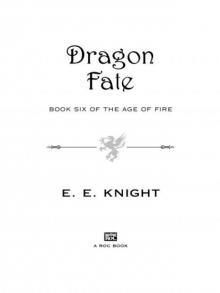 Dragon Fate: Book Six of The Age of Fire
Dragon Fate: Book Six of The Age of Fire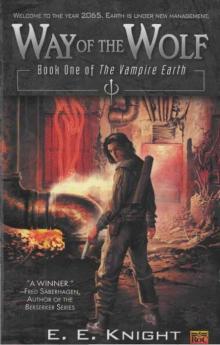 Way Of The Wolf
Way Of The Wolf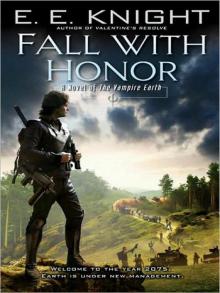 The Vampire Earth: Fall with Honor
The Vampire Earth: Fall with Honor